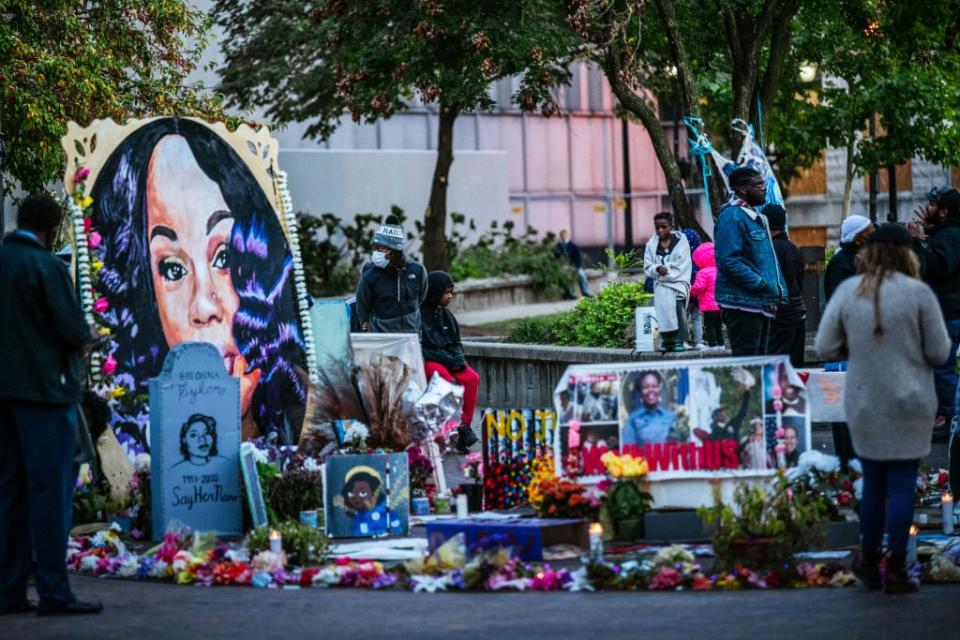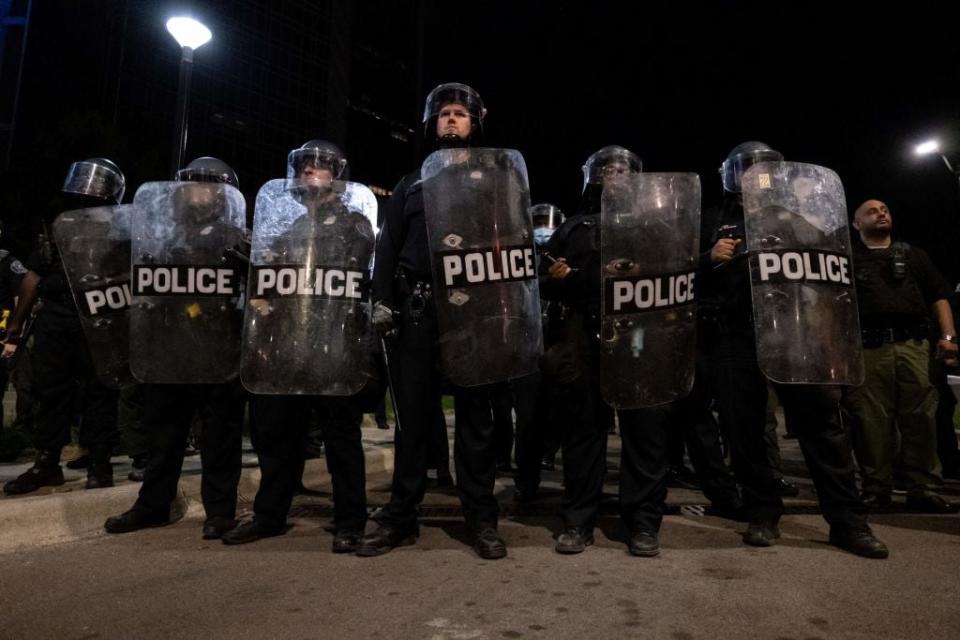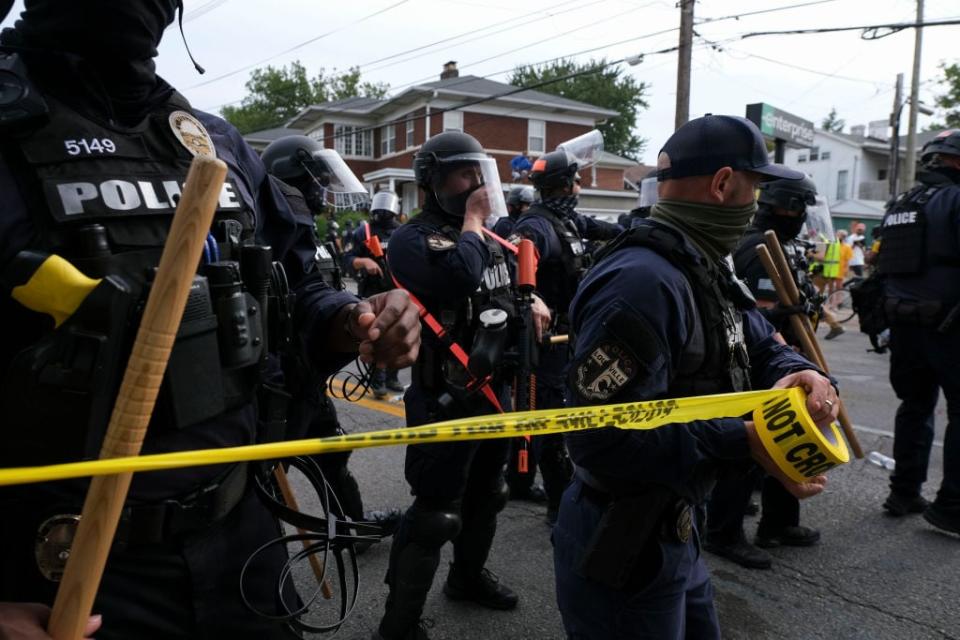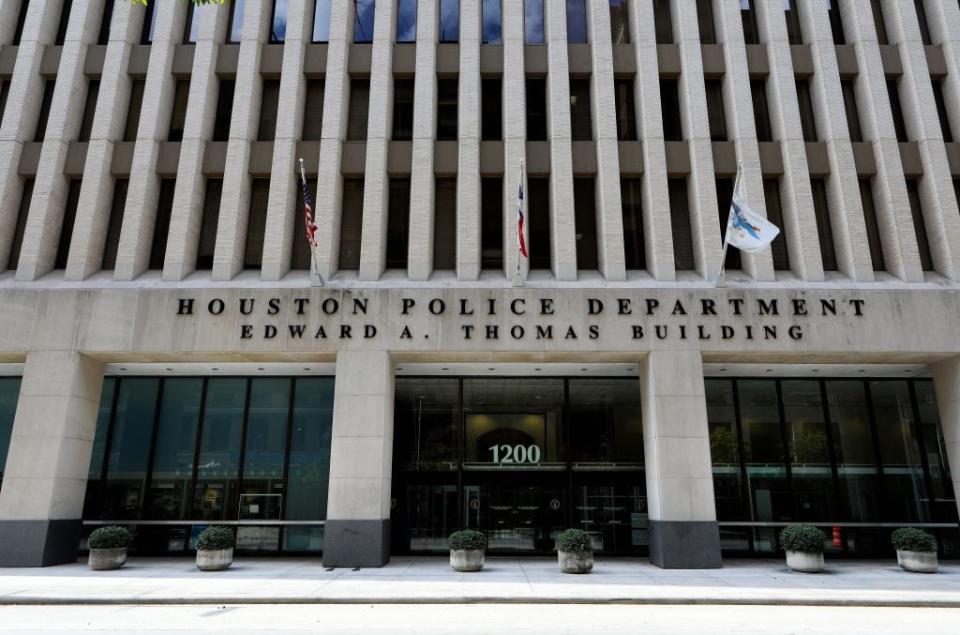This is what it looks like when cops lie
- Oops!Something went wrong.Please try again later.
On the third anniversary of Breonna Taylor’s death, theGrio examines the effects of lies police place in search and arrest warrants.
Darell Chancellor was at work in Detroit when he got a frightening call in November 2011. Police were in his mother’s house with a warrant conducting a raid. A year later, he started a minimum 14-year term in prison for drug possession.
In 2016, Houston officers secured a warrant to look for marijuana at Frederick Jeffery’s house. The officers reportedly found methamphetamine. A judge sentenced Jeffery to 25 years in prison.
Three years ago today in Kentucky, Louisville officers, based on sworn police statements in a warrant, entered Breonna Taylor’s apartment. Shortly after, the 26-year-old emergency room technician was dead from five gunshot wounds.
Three states. Three lives changed forever. Three lies.

The raids that led to Taylor’s death and a total of 12 years of lost freedom for Chancellor and Jeffery all started with police officers falsifying warrants. Across the country, cops regularly lie on search warrants, arrest warrants and warrant affidavits, defense attorneys, experts and law enforcement officials say. They have firsthand knowledge. The Black community has some, too. For decades, Black people shared anecdotes about police lies and planted evidence. TheGrio sought facts.
To gather data, theGrio partnered with Boston University’s Justice Media Computational Journalism co-Lab, a collaboration between the College of Communication and Spark!, an experiential learning lab and technology incubator that uses data-driven projects to empower student innovation and applied research endeavors. Justice Media co-Lab students evaluated a database of 3,285 cases in which a judge exonerated a convicted person between 1989 and 2022. The database is part of the National Registry of Exonerations, a project involving the University of California Irvine, University of Michigan and Michigan State University. Of those cases, 384 of them mentioned the word “warrant.”
At least 51 exoneration cases out of the 384 involve some kind of warrant misconduct. Twenty-four of those cases involve falsified warrants. Of the 51 cases, the states with the most frequent occurrences are Texas, Illinois and Massachusetts.
“Lying is a normal part of policing. It’s a common open secret in the criminal courts,” Philip Stinson, a former police officer and criminal justice professor at Bowling Green University says. “Everybody knows it. Judges, defense lawyers, prosecutors, police officers. They all know that police officers routinely lie.” Stinson runs a police crime database that tracks all the criminal cases involving police officers between 2005 and 2017.
There’s an old adage: “If you lie, you’ll cheat. If you cheat, you’ll steal. If you steal, you’ll kill.” Taylor’s death, the cases of Jeffery and Chancellor – they illustrate that lies aren’t just words.
‘Complete and utter bullsh*t’
When Chancellor’s mother called him about the raid, he tried to comfort and reassure her. Officer Stephen Geelhood then got on the phone with him, Chancellor said.
“What are you doing? I didn’t do nothing,” Chancellor recounted telling Geelhood on Nov. 2, 2011. Geelhood said that the police needed to meet Chancellor. “They wanted me to roll over on someone else, and he threatened to put what they found in the house on me if I didn’t have more information for him.”
In a search warrant, Geelhood and other officers claimed they saw someone selling heroin in front of that house the day before the raid. The warrant also said an informant told the officers that heroin sales went down in the house.

The raid yielded cocaine and an unregistered handgun in a bedroom. A letter addressed to Chancellor was in the same room as the gun, according to court documents.
Geelhood ended the call. Chancellor, who had been released from prison earlier that year, said he figured if police wanted to reach him, they would call his parole officer. But that never happened.
Six months later police pulled over Chancellor for what his lawyer described as a “headlight issue” in a classic case of driving while Black. That’s when officers informed Chancellor that there was an arrest warrant for him related to the raid. He went to trial in November 2012, accused of drug and firearm possession. It was a bench trial – no jury, just a judge.
Geelhood testified that he surveilled Chancellor’s mother’s house after he got a tip about drug sales. While watching, Geelhood said, he saw a man who appeared to be in his 30s, about 5 feet, 8 inches tall and 180 pounds, no eyeglasses, selling drugs in front of the house.
Chancellor wore glasses all the time, stood almost 6 feet tall and weighed close to 250 pounds at the time of the raid. He told the judge that he lived with his mother only briefly after leaving prison and hadn’t lived in her house since nine months before the raid.
The judge believed Geelhood’s evidence. He found Chancellor guilty of cocaine possession. “The judge felt he was credible, and that’s why I got convicted,” he says today. Because of his priors, the judge sentenced him to 14 to 30 years in prison.
But there was a problem. Geelhood lied.
In 2019, with her son seven years into his prison sentence, Chancellor’s mother heard about suspected corruption in the Detroit Police Department’s narcotics unit and an investigation of its officers. Many of the drug officers in the department were under internal investigation for stealing guns and money, falsely accusing people of committing crimes and falsifying search warrants.
She and Chancellor pleaded with the Wayne County Conviction Integrity Unit (CIU) to investigate her son’s case. It did. The unit “could find no evidence that a tip had been provided to Geelhood or that he had conducted the claimed surveillance,” according to the Michigan State Appellate Defender Office. In 2020, the prosecutor dismissed charges against Chancellor. After eight years in prison, he returned home to his family.
“[Geelhood] absolutely lied under oath,” Ven Johnson, an attorney who represents Chancellor in a lawsuit against the city of Detroit, says. “His search warrant affidavit is complete and utter bullsh*t.”
The Detroit Police Department did not respond to theGrio’s multiple requests for comment. But in 2020, the Detroit News reported the police chief said his department was investigating Geelhood. According to Johnson and other local reports, Geelhood is still on the police force.
Lethal ‘shortcuts’
The lie on the search warrant in Chancellor’s case bares similarities to the lies that led to Breonna Taylor’s death three years ago. The cases just ended differently. Chancellor went to prison and then rejoined his family. Taylor is gone. Forever. Her death became a driving force behind the 2020 racial reckonings across the United States.
After years of questions from the community in Louisville and Taylor’s family, in 2022, the federal government arrested four Louisville Metro Police Department (LMPD) officers involved in the raid. Two of the officers — Kyle Meany and Kelly Goodlett — allegedly lied on the search warrant application for Taylor’s apartment.
They told the judge that their real target — Taylor’s ex-boyfriend Kenneth Walker — was getting packages delivered to her house for him, but there was no evidence of that. Goodlett pleaded guilty to felony conspiracy and is expected to cooperate with the federal government in the trial for Meany and another officer charged — Joshua Jaynes. Their trial is in October.

“On March 13, 2020, Breonna Taylor should have awakened in her home as usual, but tragically she did not,” U.S. Assistant Attorney General Kristen Clarke said when her office formally charged the officers. “Since the founding of our nation, the Bill of Rights to the United States Constitution has guaranteed that all people have a right to be secure in their homes, free from false warrants, unreasonable searches and the use of unjustifiable and excessive force by the police.”
The Department of Justice released a report last week that found a pattern of discrimination in the Louisville Metro Police Department. “This conduct is unacceptable. It is heartbreaking. It erodes the community trust necessary for effective policing,” U.S. Attorney General Merrick B. Garland said about the report.
While the justice that followed the cases of Taylor and Chancellor was a rarity, the actions of the officers were not.
It’s easy to see why this is so pervasive in police departments, experts say, specifically in cases that involve drugs like those of Jeffery, Taylor and Chancellor. “It’s like taking a shortcut at your job. If you get away with it the first time, you’re going to keep doing it,” says Carlton Williams, a former criminal defense attorney and law professor at Cornell University.
Joseph Grant, a professor at the University of Louisville, spent several years as an officer in the Jefferson County Police Department and later with Louisville police. With a 24-year career in law enforcement, Grant said he witnessed this type of misconduct.
“It happens, and when you break it down, the biggest problem is a lack of accountability and a lack of supervision,” Grant said. “There is a tendency to want to take the shortcut. The problem is we lose sight of our responsibility and our humanity.”
That shortcut includes officers saying they saw something they didn’t and putting it in a search warrant or arrest warrant.
Judges have to approve the search warrant application that police officers bring them. When it comes to drug cases, the judge likely is going to take the word of the cops. “Judges are not the world’s most skeptical creatures in these cases. They tend to believe the police,” Ken Otterbourg, a researcher with the National Registry of Exonerations says. “The probable cause for [these kinds of] warrants doesn’t get examined with a high level of scrutiny.”
That’s compounded by the fact that more than 90% of criminal cases don’t go to trial. “What happens is if the police enter your house with a search warrant that they got a judge to sign and you get arrested on it, there’s a pretty good chance you’re not going to trial, and you’re going to just plead it out,” Otterbourg says.
It’s only later when something unravels, as it did with Chancellor, or when someone dies, as was the case with Breonna Taylor, that authorities go back, examine the warrant and question it, experts say. For the vast majority of these cases, no one examines warrants closely, crime researchers stress.
That’s why it’s so difficult to quantify how often this happens. “We have 18,000 different police departments across the country, 18,000 different chiefs, 18,000 ways of administration,” Ralph Godbee, the former chief of the Detroit Police Department says.
A way to possibly understand the frequency of fraudulent warrants is to consider the prevalence of “official misconduct” that required a person’s exoneration. In the exoneration database, of the 384 cases that showed up in the “warrant” search, 276 involved “official misconduct.”
Official misconduct means that “police, prosecutors, or other government officials significantly abused their authority or the judicial process in a manner that contributed to the exoneree’s conviction,” the database website states.
Now consider this: Only two states did not have exonerations related to official misconduct during that time frame. Forty-eight states and Puerto Rico did. That means misconduct is happening almost everywhere on U.S. soil. And remember, first, those are only cases that received review, and second, something usually has to go headline-grabbing wrong before a law enforcement or investigatory agency decides to double-check police work. Or maybe, someone observes a suspicious trend.
If a lie works once, officers use it again
During Godbee’s tenure in Detroit, the department was under several federal consent decrees because of excessive force, civil rights violations and misconduct. Those decrees mean there’s a court order mandating departmental changes to align with constitutional protections. Godbee spent time working with the federal mandates to make sure that the department complied with the proper investigatory processes and procedures. That included ensuring the veracity of all written reports.
“When you audit these kinds of documents you will see a pattern in reports that narratively is similar to other reports that officers have done when they successfully find that this narrative grants the signature of a judge,” Godbee says. “Narratives don’t match that neatly unless you have a pattern that’s working for you. Multiply that by 18,000.”
Still, it’s hard to catch these incidents in real time, which is why officers get away with it – like in Houston, when officer Gerald Goines arrested Frederick Jeffery in October 2016.

Goines said that his informant bought drugs from a house. He got a search warrant and went to the house. When he got there, Goines claimed that he saw Jeffery and another man putting burglar bars on the front door.
Goines said they found several grams of methamphetamine inside the house. They arrested both men on charges of drug possession and sale. Jeffery went to trial in 2018 and a jury convicted him of possessing a controlled substance. Due to his extensive criminal history, the judge sentenced him to 25 years in prison.
Throughout his detention and trial, Jeffery claimed that Goines framed him. While incarcerated, he wrote letters to the judge, pleading for a review of his case.
A year after Jeffery went to prison, Goines led a no-knock warrant raid in April 2019 in which police killed two people in their home. The Houston Police Department began investigating Goines and found that he lied on the search warrant application for the no-knock raid.
As they continued to investigate, Houston police discovered multiple fake drug buys involving Goines. He is now facing murder and civil rights violation charges for the deaths of Dennis Tuttle and Rhogena Nicholas in the no-knock raid, and he admitted to lying on the warrant application. Coincidentally Goines, in 2004, arrested George Floyd, whose murder in 2020 also sparked the national racial reckonings. Despite Goines’ tarnished reputation, Floyd’s family has not prevailed in efforts to clear his name, and that drug arrest remains on his record.
The Texas Court of Appeals vacated Jeffery’s case in July 2022. Goines lied on the search warrant application for the house where Jeffery was. Goines had an informant whom he paid to lie about buying drugs from specific people.
Jeffery and his mother did not respond to multiple requests for comment, but he did speak to a local news station after his release. “I knew [Goines] was crooked,” Jeffery told ABC News 13 in Houston last summer., “You can’t be an officer of the law and be crooked. You have to be an officer of the law for the people.”
Goines’ misconduct is alleged to have reached thousands of cases, impacting hundreds of lives in Houston.
For some, such as Chancellor, Jeffery, and Taylor’s family, who received a $12 million settlement, there’s a measure of justice. But usually, lying on warrants goes unchecked. “It shows you that it’s a good old boys’ network where they would argue that the ends justify the means,” Ven Johnson, Chancellor’s lawyer says. “You can lie, you can cheat and you can steal because you’re getting bad guys off the streets.”
Police lies contribute to the fractured relationship between law enforcement and the disenfranchised minority communities where they work. “If you have dirty cops, you have a dirty system and people won’t respect it,” Johnson says.
Criminal justice experts say everyone in the criminal justice system has a role to play in eliminating the falsification of warrants.
“Judges and prosecutors need to push back and question police officers more,” the exoneration registry’s Otterbourg says. “They need to be more skeptical of what the police bring them.”
For people like Joseph Grant and others who worked in law enforcement for decades and have great admiration for the profession, eliminating the lethal lies and shortcuts on warrants starts with police leadership.
“The management is the most important piece of policing. Supervisors and sergeants are the most important individuals in your department,” Grant says. “We need leaders who have a strong sense of humanity and leaders who are courageous enough to hold themselves and others accountable. That person I’m arresting is somebody’s child.”
Godbee, the former Detroit police chief, lists investigating community complaints among the solutions for dishonest officers. “We can’t just take the officers’ word as gospel,” he said. “Community member complaints have to hold some weight as well. If you collect data appropriately, you can discern different patterns of what police officers are doing out on the streets.”
In Detroit, Chancellor feels fortunate. He’s staying out of trouble, raising his 11-year-old son and “trying to rebuild relationships that were lost during those years I was away.”
“I just hope I don’t run into [Geelhood] again,” he says. “He still patrols the streets.”
Boston University’s Justice Media Computational Journalism co-Lab, a collaboration between the Faculty of Computing & Data Sciences’ BU Spark! program, the College of Communication, and the BU Hub Cross-College Challenge, contributed to this report. Contributing students were Sofie Gavin-Melamed, Derinell Rojas and Zuizz Saeed.
TheGrio is now on your TV via Apple TV, Amazon Fire, Roku, and Android TV. Also, please download theGrio mobile apps today!
The post This is what it looks like when cops lie appeared first on TheGrio.

